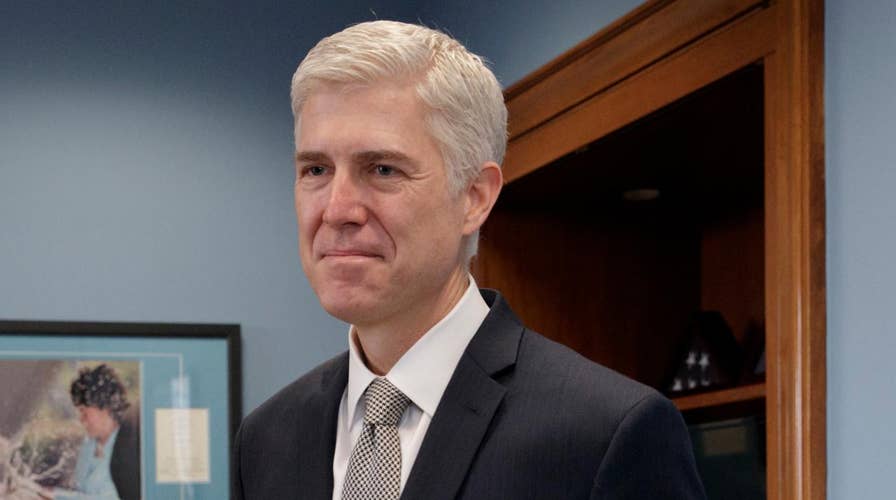Judge Neil Gorsuch heads to the Hill on Monday for confirmation hearings, and we’re told to wait for the fireworks. Only thing is, they won’t happen. It’s a foregone conclusion that he’ll take his seat as the ninth member of the Supreme Court on the first Monday next October.
Unless another member of the Court falls under a bus between now and then.
Liberal opposition research groups are struggling mightily to find ammunition to lodge at Gorsuch. They won’t come up with much that we haven’t heard already, and that’s not been anything of note.
Here’s the worst of it. He studied at Oxford University under John Finnis and wrote a thesis on euthanasia for him. Finnis is a natural lawyer who believes that law’s legitimacy derives from its adherence to rational principles about justice, which in turn can be understood by deliberating about common principles of humanity.
That’s what natural law means, and Jeremy Bentham called it "nonsense of stilts." That seems right to me.
Amongst the people I know, natural law theories have been taken up by conservatives who pick their philosophies according to how they advance their political agenda. It’s like saying, “I’m right-wing so I should like Christian rock.” It’s really just about politics. It’s what happens when pundits and law professors pretend they’re philosophers.
You can also be skeptical, as Blaise Pascal was, about whether you’d find anything very uplifting in examining how people behave. We’re no angels. Which is something James Madison and the other Framers of our Constitution well understood. They weren’t natural lawyers.
All this sounds like an issue that only legal philosophers would care about. Except for one thing. If you can derive a principled objection to euthanasia from natural law, as Gorsuch did in his book, that’s going to bother the right-to-die crowd. And then there’s the slippery slope.
If Gorsuch thinks mercy killing wrong, what about abortion, same-sex marriage and all of the other causes prized by the left? Nothing in Gorsuch’s book spoke to them, but for the lifestyle liberals who have captured the soul of the Democratic Party those are the issues that matter. Not jobs, just transgender bathrooms.
Gorsuch is going to be asked how he’d rule on these issues. Problem is, those are easy questions for a nominee to deflect. All you have to do is pull a Ginsburg.
In other words, the nominee needn’t—and shouldn’t—answer questions about how he would vote in future cases. He shouldn’t tie himself down before he’s read the briefs and heard the arguments.
If he announces in advance that he’s made up his mind, that arguments can’t move him, he should recuse himself from deciding on the case. That’s what Ruth Bader Ginsburg said when she was up for confirmation. Made sense then, and it makes sense now.
So the questions will turn to a more abstract, a more philosophical level. Anything you can do, I can do meta.
Gorsuch is going to be asked whether he’d decide cases according to his understanding of natural law, and pray tell just what does that mean to him about when life begins and might end.
Once again, however, Gorsuch has an easy out. What he’ll say, and what I think he believes, is that a judge should confine himself to the rules explicitly set forth in our constitution, legislation and case law, and to the principles implicit therein. There are foundational ideals in America law, and while some of them overlap with natural law doctrines, they’re to be followed because they’ve been incorporated into our law and not because some philosopher voiced them.
The reason why I think that’s what Gorsuch believes is because he’s made clear his deep admiration for Justice Scalia. And Scalia was a textualist who didn’t think the Supreme Court should be a roving commission sent to search for principles of justice from sources other than well-recognized legal doctrines. That’s pretty much what Justice Kagan said when she was up for confirmation, and Neil Gorsuch should take a page from her.
Justices Ginsburg and Kagan are justly well-respected judges. So is Merrick Garland. It says something about Gorsuch that, when he heard he had been chosen by the president, his first phone call was to Judge Garland. But elections have consequences, as someone once said. Like the president, Gorsuch is a conservative, even as Ginsburg and Kagan are liberals.
Scalia was a conservative as well. Some argue that Gorsuch should be confirmed because he’s stepping into Scalia’s seat.
Nonsense. Conservatives don’t have ownership of a seat on the Court, any more than liberals had ownership of a Massachusetts Senate seat when Ted Kennedy died.
There’s another reason why liberals won’t want to accept the argument that conservatives are entitled to a Scalia seat on the Court. It’s because this is the fight that matters, the one that will determine whether a Court now split 4-4 between conservatives and liberals on most issues will become a 5-4 Court dominated by conservatives. And that in turn will decide whether the executive branch will be permitted to wrestle its foreign policies and its travel ban from the judicial branch of government.

